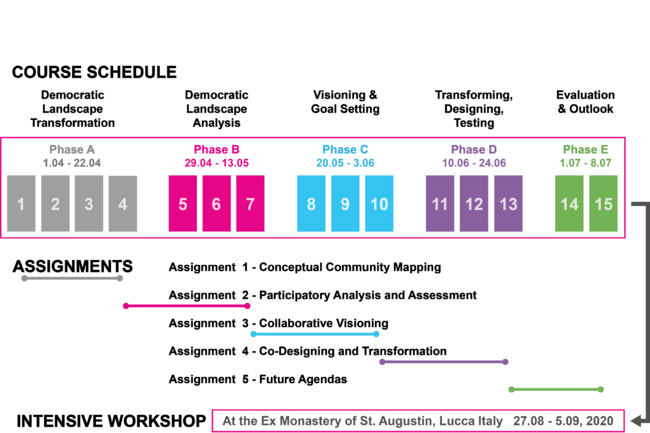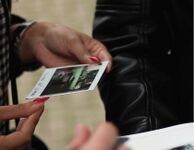Seminar Landscape Education for Democracy 2020
{{#evu:https://www.youtube.com/watch?v=U1FlOjd1bG8&feature=youtu.be |alignment=right |dimensions=500 |description= You want to learn more about the LED programme? Please have a look at the video documentation of our online seminar and intensive study programme 2016. }} Are you a planning or design student interested in learning how to create more inclusive, open and democratic landscapes?
Then participate in the LED Program – an exciting way to earn credits and strengthen important professional skills.
- This page documents the LED Online Seminar conducted from April - July 2020
- Download the course outline as PDF
- For any further information please email us under info(at)led-project.org
Our project and learning activities
The landscape belongs to everyone. We should all have equal access to it and a voice in how it is used, valued and maintained. However, spatial planning education rarely includes considerations of democratic processes, participatory planning, community design and landscape stewardship. Furthermore, it does not fully prepare young practitioners to become leaders in promoting democratic landscape change and work effectively in partnership with communities.
The idea behind the LED (Landscape Education for Democracy) project, a partnership between 5 European landscape architecture faculties and the LE:NOTRE Institute is to promote awareness and empower young design and planning professionals to become more active in shaping democratic change. Our goal is to fill a gap in design and planning education and give students the opportunity to confront themselves with pressing issues of landscape democracy, right to the landscape and participation.
Working Groups 2020
Our 2020 teams worked in different living labs across Europe over the summer term 2020. The locations were: Budapest (HU), Bologna (IT), Nürtingen (DE), Freising (DE), Dublin (Ireland) and Aubrac (France).
Bologna Living Lab
Budapest Living Lab
Dublin Living Lab
France-Aubrac Living Lab
Freising Living Lab
- Freising Team 1
- Freising Team 2
- Freising Team 3
- Freising Team 4
- Freising Team 5
- Freising Team 6
- Freising Team 7
- Freising Team 8
- Freising Team 9
Nürtingen Living Lab
LED Seminar Schedule 2021
- Unfortunately, we could not implemente the intensive study programme in Lucca because of the COVID-19 restrictions.
Information material and LED resources
- LED2LEAP 2020 Materials and Recordings (open access)
- LED reading list
LED Publications 'Partnering for Landscape Democracy':
- LED Process Report: Landscape Education for Democracy Co-creating a socially-engaged landscape planning and design education for sustainable development, download LED Process Report: Landscape Education for Democracy
- Zingonia - Partnering for Landscape Democracy
- Kassel - Partnering for Landscape Democracy (both free download)
LED in action - some impressions from the Kassel workshop 2017
Course schedule and content for 2020
Online seminar: April-June 2020
The online module consists of twelve 90-minute sessions of lectures, reading materials, collaborative group work, concept mapping, storyboarding and other diverse active and passive learning tools.
Themes covered in the course are:
- Democratic Landscape Transformation
- Democratic Landscape Analysis
- Collaborative Visioning and Goal Setting
- Collaborative Design
- Evaluation and Future Agenda Setting
- More details on the schedule will be published soon.
Conditions for participation and credits
Participation in the online seminar is free and open to students at any institution as well as the general public.
There are no registration fees. Participation is possible in two modes.
Full participation includes:
- regular attendance of the online class (or working with the seminar recordings in due time)
- completion of the seminar coursework and group assignments
- academic recognition of up to 5 ECTS
Following includes:
- visitation of online seminar sessions either in real time or through video recordings;
- possibility to do a final assessment
Further information
- please contact info(at)led-project.org
- Find us on Facebook
Our partnership
Seminar partners
- LE:NOTRE Institute (coordinator), an international foundation based in Wageningen, Netherlands.
- Nürtingen-Geislingen University, Nürtingen, Germany
- Hungarian University of Agriculture & Life Sciences, Faculty of Landscape Architecture, Budapest, Hungary
- KulturActiv, NGO, Budapest, Hungary
- University of Bologna, Department of Architecture, Italy
- ETABETA, NGO, Bologna, Italy
- SLU, Swedish University of Agricultural Sciences, Uppsala, Sweden
ERASMUS+ Strategic Partnership Programme






